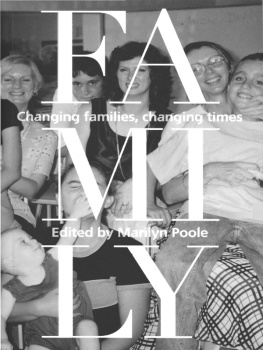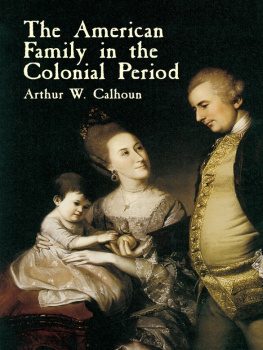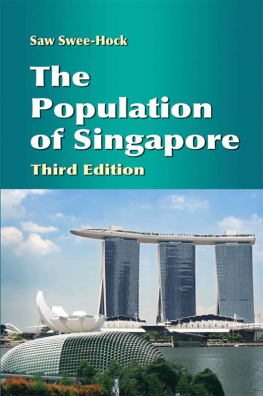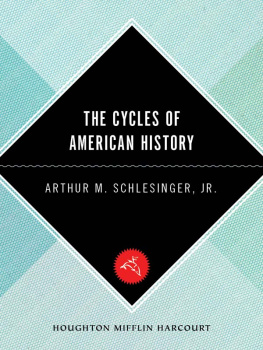Family Cycles
Marriage and Family Studies Series
Allan C. Carlson, editor
The Marriage and Family Studies Series features interdisciplinary, comparative, international research on human relationships defined by marriage, genetic bonds, and adoption. Some specific subjects include the nature of family systems, sexuality, multi-generational ties, gender relations, child-rearing practices, population policies, stepfamilies, international adoption policies, and divorce. The series seeks new research and perspectives on these foundational human ties.
Titles in this series include:
Family Cycles
The Natural Family Where It Belongs
Godly Seed
Connecting the Dots
Conjugal America
Divided We Fall
Fractured Generations
The Family in the Modern Age
Adolescent Stress
Families and Health Care
Dating, Mating, and Marriage
The Adopted Child
Family Social Welfare
Family Cycles
Strength, Decline, and Renewal in American Domestic Life, 16302000
Allan C.Carlson
First published 2016 by Transaction Publishers
Published 2017 by Routledge
2 Park Square, Milton Park, Abingdon, Oxon OX14 4RN
711 Third Avenue, New York, NY 10017, USA
Routledge is an imprint of the Taylor & Francis Group, an informa business Taylor & Francis.
Copyright 2016 by Taylor & Francis.
All rights reserved. No part of this book may be reprinted or reproduced or utilised in any form or by any electronic, mechanical, or other means, now known or hereafter invented, including photocopying and recording, or in any information storage or retrieval system, without permission in writing from the publishers.
Notice:
Product or corporate names may be trademarks or registered trademarks, and are used only for identification and explanation without intent to infringe.
Library of Congress Catalog Number: 2015047586
Library of Congress Cataloging-in-Publication Data
Names: Carlson, Allan C., author.
Title: Family cycles : strength, decline & renewal in American domestic life, 1630-2000 / by Allan C. Carlson.
Description: New Brunswick : Transaction Publishers, 2016. | Includes bibliographical references and index.
Identifiers: LCCN 2015047586 (print) | LCCN 2016011562 (ebook) | ISBN 9781412863032 (hardcover) | ISBN 9781412863322 (pbk.) |
ISBN 9781412863469
Subjects: LCSH: Families--United States--History.
Classification: LCC HQ535 .C2814 2016 (print) | LCC HQ535 (ebook) | DDC 306.850973--dc23
LC record available at http://lccn.loc.gov/
2015047586
ISBN 13: 978-1-4128-6332-2 (pbk)
ISBN 13: 978-1-4128-6303-2 (hbk)
For Beckett, Aspen, Nautica, Ruby, Jack... and those who follow.
Contents
8 The Whirlwind, 19702000
There are three ways in which historians have tried to make sense out of the history of the modern family in America. The oldest of these might be labeled the Liberal, or Whiggish, interpretation. First offered in Henry Sumner Maines mid-nineteenth century classic, Ancient Law, this thesis holds that the change in all progressive societies including the United Statesis from Status to Contract. In pre-modern societies, rulers or legislators only reached to the heads of families. These patriarchal males then governed the women, children, and servants within their domestic domain. The status of each personmale or female, parent or child, free or servantwas fixed by custom and law. Political entities were composed of patriarchal households, not of individuals.
However, Maine argues that the sphere of civil law, small at first, tends steadily to enlarge itself. Along the way, ever more personal rights and ever greater amounts of property are removed from exclusive domestic control and brought to the attention of public tribunals. This movement features the gradual dissolution of family dependency and the growth of individual obligation in its place. The individual is steadily substituted for the Family, as the unit of which civil laws take account. In place of duties fixed by Status arises Contract, the free agreement of individuals. The political order now focuses on discrete persons alone. The family, as such, is left with greatly diminished authority and few enforceable claims.
The second theory of historical interpretation is Marxist. Loosely inspired by the musings of Karl Marx and Friedrich Engels,
Calhoun, like Maine, saw the history of the family moving, or evolving, in a distinctive way. In the formers interpretation, society is working toward Socialism, which would deliver [t]he regeneration of the family. The meaning and spirit of Socialism would require a new set of family values, including: absolute sex equality; the scientific pedagogy of sex relations; a thoroughgoing eugenics enforced at the outset by legislation; public provision of ideal conditions for pregnant women and nursing mothers; volitional limitation of the size of family; equality of opportunity for every child born... and subsidy where necessary; social mediation in case of serious family dissention; and eased divorce when deemed best for all concerned. Since technological innovation in the economy would never end, Calhoun emphasized that the evolution of the family would also never come to a rest. And since in the light of social evolution, nothing is right or valuable in itself, he anticipated that there will ultimately be as many types of sex commerce as there are of individual taste. Indeed, Calhoun predicted the return of legal polygamy in the new family order.
A third school of historical interpretation has emerged in the early years of the twenty-first century. It draws on both the Liberal and Marxist interpretations, while bringing in other philosophical strands: the emotionalism of Jean-Jacques Rousseau; the personal moral heroism of Friedrich Nietzsche; and the sexual enthusiasm of Havelock Ellis. Focusing on the love revolution, representative authors are American historians Nancy Cott and Stephanie Coontz. Their view of historical evolution sees the family moving from an institution focused primarily on the procreation of children and the preservation of familial property toward a flexible lifestyle choice involving no prescribed roles. Such choices turn marriage into a personal and private relationship that should fulfill each individuals emotional and sexual desires. This transition has meant the rejection of any particular marriage model, most particularly the Christian one. Similarly, it has rejected all appeals to nature or to a natural family order. This love revolution has also undermined the use of law and public policy to sustain a gender order. Most tellingly, it has denied the procreation of children as a defining, or even important, feature of marriage.
On the positive side, Cott argues that historical evolution is bringing new understandings to the categories of husband and wife. Instead of being a rigid institution, marriage is being turned into the final destination of a love match. Freedom and private choices are enhancing, rather than damaging, marriage and family. This is why, she says, the push for same-sex marriage has actually renewed the honor attached to conjugal bonds. Overall, the patch worked emotions and practices with which individuals endow their unions color the evolving institution of marriage.







